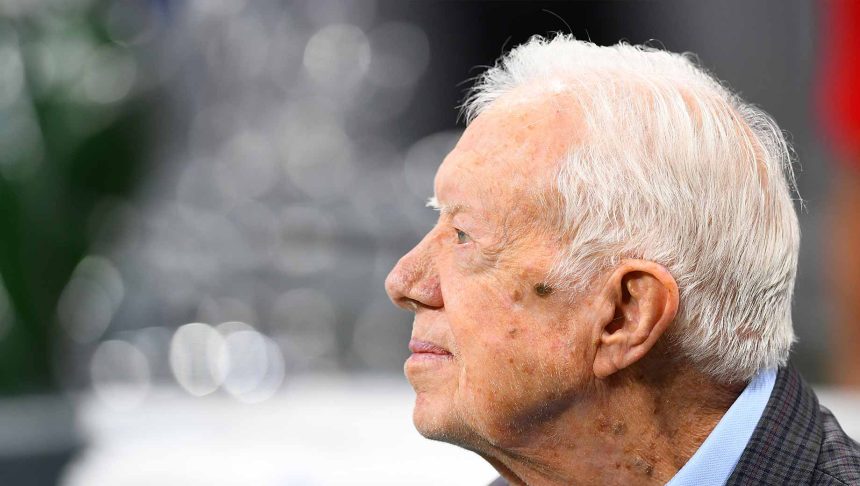James Earl Carter Jr., better known as Jimmy Carter, stands as a testament to a life dedicated to public service, humanitarianism, and unwavering faith. As the 39th president of the United States, Carter’s tenure in the White House saw landmark diplomatic achievements like the Camp David Accords and the Panama Canal treaties. While his presidency faced its share of challenges, Carter’s dedication to peace and diplomacy remained steadfast.
Post-presidency, Carter’s legacy has only grown in stature. Alongside his wife, Rosalynn, he established the Carter Center, which has become a beacon for global health, election monitoring, and human rights advocacy. Winning the Nobel Peace Prize in 2002 for his relentless efforts in fostering peace and alleviating suffering, Carter’s contributions to humanity go well beyond his political career.
A man of deep faith, Carter’s Christian beliefs have guided him throughout his life. From teaching Sunday school to writing about the intersection of faith and public service, Carter remains an emblem of how personal beliefs can shape a life of service.
Jimmy Carter: Quick Biography
- Full Name: James Earl Carter Jr.
- Born: October 1, 1924, in Plains, Georgia, U.S.
- Profession: Politician, naval officer, humanitarian, and author.
- Education: Graduated from the U.S. Naval Academy in 1946.
- Early Career:
- Served in the U.S. Navy, primarily working with submarines.
- After the death of his father, he took over the family’s peanut farming business.
- Political Career:
- State Senator: Elected to the Georgia State Senate in 1962 and re-elected in 1964.
- Georgia Governor: Served as the Governor of Georgia from 1971 to 1975.
- 39th President of the United States: Elected in 1976 and served a single term from 1977 to 1981. Notable for brokering the Camp David Accords between Israel and Egypt and for establishing the Department of Energy and Department of Education. Faced challenges like the energy crisis, stagflation, and the Iran hostage crisis.
- Post-Presidential Activities:
- Founded the Carter Center in 1982 in partnership with Emory University, with a goal to advance human rights and alleviate suffering.
- Won the Nobel Peace Prize in 2002 for his efforts to find peaceful solutions to international conflicts, advance democracy and human rights, and promote economic and social development.
- Authored numerous books on a variety of topics, from his presidency to his personal life, from Middle East peace to poetry.
- Personal Life:
- Married to Rosalynn Smith since 1946, and they have four children.
- A devout Baptist, Carter has taught Sunday school for much of his life and has been known for his deep faith.
- Recent Years:
- Despite being in his nineties, Carter has remained active in various humanitarian efforts, including building houses with Habitat for Humanity.
- He’s been open about his health challenges, including a cancer diagnosis, which he announced in 2015. He later reported that he was cancer-free following treatment.
Early Education of Jimmy Carter
Jimmy Carter attended public schools in his hometown for his foundational education. Hailing from a humble background, Carter displayed an early aptitude for learning and a keen interest in academics. This initial phase of his education laid the groundwork for the remarkable journey that awaited him in the years to come.
College Years: Emory University and Naval Academy
Carter began his college education at Georgia Southwestern College and then transferred to the Georgia Institute of Technology. However, his long-held desire was to attend the prestigious U.S. Naval Academy. In 1943, he was admitted to this esteemed institution in Annapolis, Maryland.
At the Naval Academy, Carter excelled both in academics and leadership. He graduated in the top 10% of his class in 1946 with a Bachelor of Science degree. His time at the Naval Academy set the stage for his later achievements in public service and beyond.
Life After College: From Navy to Presidency
Carter’s career in the Navy lasted until 1953, after which he returned to Georgia to manage his family’s peanut-growing business. His journey in politics started from here, leading him to the Governorship of Georgia and ultimately to the Presidency.
Impact of Education on Carter’s Life
Carter’s education, particularly his time at the U.S. Naval Academy, had a profound impact on his life and career. It not only provided him with a strong academic foundation but also shaped his leadership style and values.
Frequently Asked Questions about Jimmy Carter’s Education and Early Career
Q1: Where did Jimmy Carter go to college?
A1: Jimmy Carter initially attended Georgia Southwestern College and the Georgia Institute of Technology. He later transferred to the U.S. Naval Academy, graduating in 1946.
Q2: What did Jimmy Carter study in college?
A2: At the U.S. Naval Academy, Jimmy Carter earned a Bachelor of Science degree.
Q3: How did Jimmy Carter’s college education impact his career?
A3: Carter’s education, especially his experiences at the U.S. Naval Academy, played a pivotal role in shaping his leadership qualities and values. These greatly influenced his later political career.
Q4: Did Jimmy Carter pursue further education after his Bachelor’s degree?
A4: No. After graduating from the U.S. Naval Academy, Carter served in the Navy until 1953. Upon leaving, he returned to Georgia to oversee his family’s peanut business.
Q5: How long did Jimmy Carter serve in the Navy after graduating from college?
A5: Post his 1946 graduation from the U.S. Naval Academy, Jimmy Carter served in the U.S. Navy for seven years.




